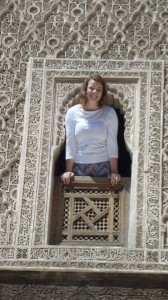Citizenship is difficult to critique on a personal level. If I were to analyze my own citizenship, I would tell myself to care more about local politics or be more involved in my community. I would try to be better informed about state and national issues. But it is harder for me to critique the citizenship of Moroccans of whom I know little about on a personal or political level. Over the past six weeks, I have learned a significant amount about Morocco, its citizens, and its political, religious, and social culture. Moroccans in general have a very wary attitude towards politics, especially about political parties, and overall they have little confidence whatsoever in the ability of their government to positively effect their society. However in contrast, the constitution of Morocco was changed due to unrest during the Arab Spring. While we learned in class that these constitutional changes will have negligible effects in reality, many citizens feel the changes will make a huge difference in their life and Moroccan society.
picture of me at a madrasa in Marrakech
I think one good step towards greater citizenship is political participation in its most basic form: voting. Many Moroccans don’t vote, but the capacity to vote allows Moroccans a voice in government of which they should take advantage. By having a majority of Moroccans choose representatives to institute laws the citizenry want, people’s faith in government may be restored (but that may just be my inner democracy-loving American talking).
Beyond just voting, Moroccans can participate in their civil society, contributing to improving their own society. Many Moroccans do participate in such groups through their mosques or because of personal interest, but there is always room for improvement on both a societal and individual level. Helping the community, improving their education and participating inservice programs betters the nation. After talking to many Moroccans, it is clear that while some people, driven by either personal or religious motives, do help their greater community, there is a significant portion of the Moroccan population that doesn’t participate in any community groups whatsoever. By moving these people towards more civil participation, they can become better citizens of both their country and the world.
Students from Duke and local Moroccan students debating about education
Protesting is another type of political participation and citizenship hard to pinpoint in Morocco. I saw it happen, and I know it is quite common, but most average Moroccans refuse to participate, either because it is illegal or they have no grievances about which to protest.
After interviewing several Moroccans, it is apparent than could be more engaged in global politics. Though many of them support Arab regionalism, they do not know significant amounts about global politics. Morocco is tied heavily to Europe and other Arab countries, but engagement with politics beyond these regions of necessity is rare. By simply informing themselves about global issues, Morrocans can learn more about their world and other global citizens.
Duke students on the second tallest Sand Dune in Morocco





9 Responses to Global Citizenship